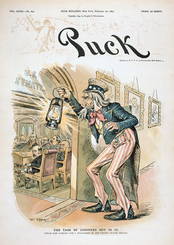
Reid proposes only to modify but not eliminate filibusters of the type memorialized by Jimmy Stewart in Mr. Smith Goes to Washington, where a steadfast minority of senators speak from the well and address the "World's Greatest Deliberative Body" without respite. Majority Leader Reid would merely reverse the more recent relaxation of the filibuster that allows a senator to express the intention to filibuster, thereby requiring a 60-vote majority to invoke cloture (a call to vote on a pending bill). Reid would make changes that -- as Washington Post reporter, Ezra Klein, notes -- are "not dramatic":
[Sen. Reid] wants to be able to make the motion to debate a bill -- but not the vote to pass it -- immune to the filibuster; he wants the time it would take to break a filibuster to be shorter; and he wants whoever is filibustering to have to hold the floor of the Senate and talk.
None of these changes would alter the basic reality of the modern U.S. Senate, which is that it takes 60 votes to get almost anything done. In my view, that means they wouldn’t do much to fix the Senate at all. (Emphasis in original.)
We no longer live in the time of Lincoln when robust Senate debate was witnessed merely by the eyeballs in the Gallery or readers of limited-circulation newspapers. Social media spreads audio, video and text of Senate proceedings in real-time around the globe. Consider, for example, the favorable reaction to Sen. Bernie Sanders' "The American People are Angry" speech railing against income inequality in 2010 that quickly went viral.
Without a softening of the filibuster rules, we're likely to witness, as we already have seen, the resuscitation of previous small-bore CRI proposals that merely traded legalization with a path to citizenship and modest future flows of temporary workers for greater border and worksite enforcement. While these measures are necessary in any CRI bill, they don't go nearly far enough to address America's 21st Century needs. As NAFSA, the Association of International Educators, recently noted:
In the acrimonious political debate about immigration reform, we lose our way by embracing a mistaken, zero-sum approach to permanent immigration. Proposals like H.R. 6429 [providing expedited green cards for students with STEM degrees but eliminating the Diversity Visa lottery -- a measure opposed by the President ] in this context appear guided by the fear of doing anything that increases the number of people who may immigrate to the United States. There is no reason to regard the current annual limit on the number of green cards as sacrosanct law.
Republicans are searching the wilderness in three camps seeking a principled immigration policy. One group remains full-throatedly opposed, like Mark Krikorian, dubbed an "anti-immigration scholar/kook" by Salon's Alex Pareene; another proposes miserly, piecemeal reforms like the Achieve Act, which would be a stricter DREAM Act with no path to citizenship (other than the second class variety); and a growing number favor CRI.
An improved set of filibuster reforms, while still protecting minority rights, might just peel off enough moderate Republicans to enact America-friendly CRI. Go Harry Go!

 RSS Feed
RSS Feed
